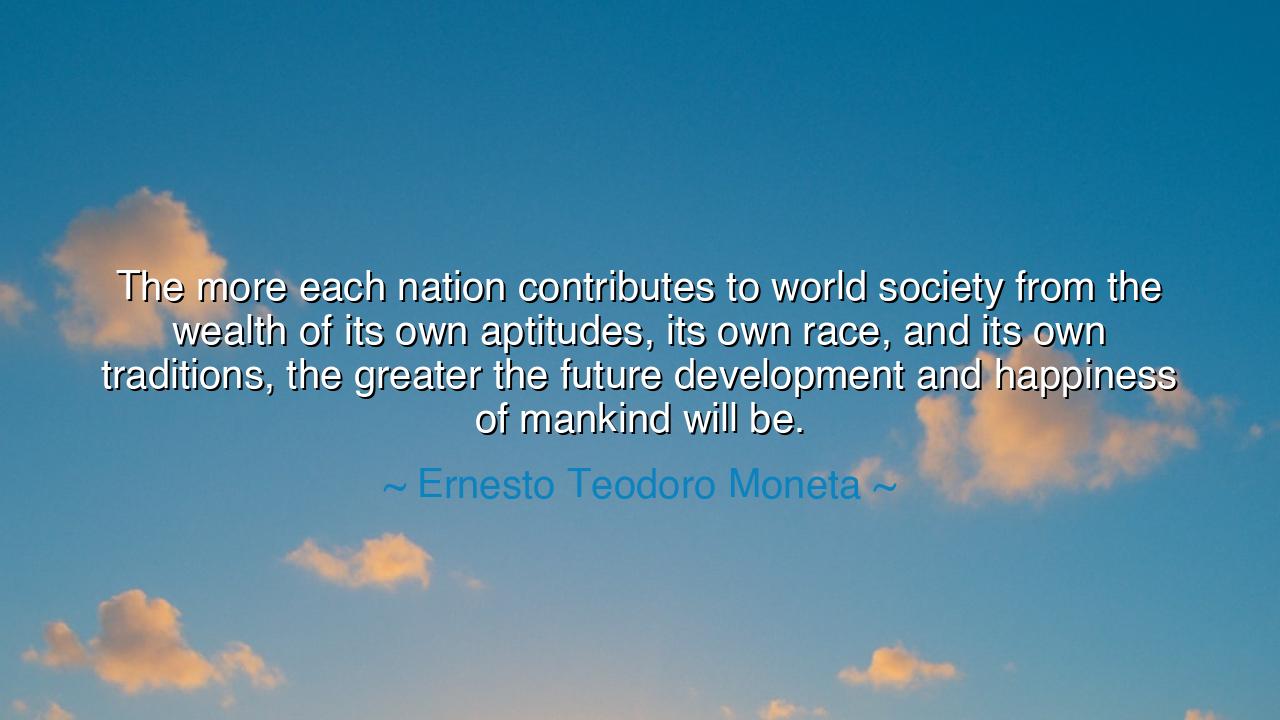
The more each nation contributes to world society from the wealth
The more each nation contributes to world society from the wealth of its own aptitudes, its own race, and its own traditions, the greater the future development and happiness of mankind will be.






When Ernesto Teodoro Moneta wrote, “The more each nation contributes to world society from the wealth of its own aptitudes, its own race, and its own traditions, the greater the future development and happiness of mankind will be,” he spoke not merely as a statesman of his time, but as a seer of human destiny. His words were born of the 19th century—a world awakening from centuries of war and division, yet struggling to understand that peace could only be built upon mutual respect among nations. Moneta, an Italian patriot who once fought for his country’s unification before dedicating his life to peace and international cooperation, understood the paradox of civilization: that unity does not mean sameness, and that the diversity of nations is not a threat to humanity’s progress, but its very foundation.
This quote carries within it the spirit of a man who had seen both the sword and the olive branch. As a soldier, Moneta had fought for liberty; as a thinker, he came to see that liberty without fraternity is hollow. His words remind us that every nation, like every soul, possesses unique gifts—born of its land, its history, and its people—and that true progress arises when these gifts are offered freely to the common good of all mankind. For when the world honors the distinct genius of each culture, it becomes a garden of many blooms, where the fragrance of one flower does not diminish another, but enriches the air for all.
From the ancient East came wisdom and meditation; from the West, invention and exploration; from the South, rhythm, passion, and life’s celebration; from the North, discipline, endurance, and thought. Each region of the earth carries its own sacred inheritance, the fruit of centuries of struggle and discovery. Moneta’s vision was that nations, instead of seeking dominion, should share their light—each contributing from its own aptitudes and traditions to form a greater harmony. Just as a symphony needs both flute and drum, so too does humanity require both the serenity of the philosopher and the daring of the pioneer. In such harmony lies the happiness of mankind, for joy springs from cooperation, not conquest.
We see the power of this idea in the story of the Renaissance, born in Moneta’s own Italy. The flowering of art and science in that age was not an isolated miracle; it was the result of exchange. The Italians drew inspiration from the Greek philosophers, who themselves had learned from the Egyptians, Persians, and Indians. Through trade, travel, and the movement of ideas, cultures intertwined, and the torch of knowledge burned brighter in every hand it touched. This was the living embodiment of Moneta’s truth—that when nations share the wealth of their traditions, humanity ascends. The Renaissance was not the triumph of one people, but the awakening of the whole human spirit.
But Moneta also warns us, by implication, of the shadow that falls when nations hoard their gifts or wield them as weapons. When pride turns to arrogance, when cultures shut themselves away or seek to dominate others, the world withers. The 20th century—just beyond Moneta’s life—would prove this lesson with terrible clarity. Wars born of nationalism, greed, and prejudice brought devastation upon the earth. Yet even from those ashes arose new alliances, new understandings, and a rekindling of his dream: the belief that peace is built not on uniformity, but on cooperation among equals.
To live by Moneta’s wisdom today is to reject the narrowness of division. It is to look upon the nations of the earth not as rivals, but as fellow travelers in the great journey of civilization. Each of us, too, as individuals, carries our own “nation” within—the traditions of our ancestors, the aptitudes of our spirit. To contribute these to the world—to offer our unique talents in service of something greater—is to fulfill the law of creation itself. The world needs every voice, every culture, every art, every mind. The mosaic is incomplete if even one piece is missing.
So, my children of the earth, learn from this: do not seek sameness, but harmony. Honor the roots of your own people, yet open your heart to the gifts of others. Let your nation, your culture, your soul, shine brightly—not as a solitary flame, but as part of the great constellation of humanity. Work, learn, create, and share—not in the spirit of conquest, but of contribution. For only when every people brings forth the best of itself—its wisdom, its courage, its compassion—will mankind ascend to the true development and happiness that Moneta foresaw: a world not divided by borders, but united by shared purpose, radiant in its diversity, and whole in its peace.






AAdministratorAdministrator
Welcome, honored guests. Please leave a comment, we will respond soon